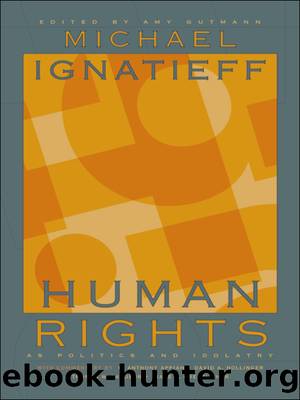Human Rights as Politics and Idolatry: by unknow

Author:unknow
Language: eng
Format: epub
Publisher: Princeton University Press
THE WEST AGAINST ITSELF
In the moral dispute between the âWestâ and the âRest,â both sides make the mistake of assuming that the other speaks with one voice. When the non-Western world looks at human rights, it assumesârightlyâthat the discourse originates in a matrix of historical traditions shared by all the major Western countries. But these Western nations interpret the core principles of their own rights tradition very differently. A common tradition does not necessarily result in common points of view on rights matters. All of the formative rights cultures of the Westâthe English, the French, and the Americanâgive a different account of such issues as privacy, free speech, incitement, the right to bear arms, and the right to life. In the fifty years since the promulgation of the Universal Declaration, these disagreements within the competing Western rights traditions have become more salient. Indeed, the moral unanimity of the Westâalways a myth more persuasive from the outside than from the insideâis breaking up and revealing its unalterable heterogeneity. American rights discourse once belonged to the common European natural law tradition and to the British common law. But this sense of a common anchorage now competes with a growing awareness of American moral and legal exceptionalism.
American human rights policy in the last twenty years is increasingly distinctive and paradoxical: it is the product of a nation with a great national rights tradition that leads the world in denouncing the human rights violations of others but refuses to ratify key international rights conventions itself. The most important resistance to the domestic application of international rights norms comes not from rogue states outside the Western tradition or from Islam and Asian societies. It comes, in fact, from within the heart of the Western rights tradition itself, from a nation that, in linking rights to popular sovereignty, opposes international human rights oversight as an infringement on its democracy. Of all the ironies in the history of human rights since the Declaration, the one that would most astonish Eleanor Roosevelt is the degree to which her own country is now the odd one out.
In the next fifty years, we can expect to see the moral consensus that sustained the Universal Declaration in 1948 splintering still further. For all the rhetoric about common values, the distance between America and Europe on rights questionsâlike abortion and capital punishmentâmay grow, just as the distance between the West and the Rest may also increase. There is no reason to believe that economic globalization entails moral globalization. Indeed, there is some reason to think that as economies have unified their business practices, ownership, languages, and networks of communication, a countermovement has developed to safeguard the integrity of national communities, national cultures, religions, and indigenous and religious ways of life.
This is a prophecy not of the end of the human rights movement but of its belated coming of age, its recognition that we live in a plural world of cultures that have a right to equal consideration in the argument about what we can and cannot, should and should not, do to human beings.
Download
This site does not store any files on its server. We only index and link to content provided by other sites. Please contact the content providers to delete copyright contents if any and email us, we'll remove relevant links or contents immediately.
| Elections & Political Process | Ideologies & Doctrines |
| International & World Politics | Political Science |
| Public Affairs & Policy | Specific Topics |
| United States |
The Secret History by Donna Tartt(16675)
The Social Justice Warrior Handbook by Lisa De Pasquale(11495)
Thirteen Reasons Why by Jay Asher(7806)
This Is How You Lose Her by Junot Diaz(5802)
Weapons of Math Destruction by Cathy O'Neil(5053)
Zero to One by Peter Thiel(4840)
The Myth of the Strong Leader by Archie Brown(4796)
Promise Me, Dad by Joe Biden(4459)
Beartown by Fredrik Backman(4438)
Stone's Rules by Roger Stone(4426)
How Democracies Die by Steven Levitsky & Daniel Ziblatt(4425)
The Fire Next Time by James Baldwin(4354)
100 Deadly Skills by Clint Emerson(4090)
A Higher Loyalty: Truth, Lies, and Leadership by James Comey(4044)
Rise and Kill First by Ronen Bergman(4026)
The David Icke Guide to the Global Conspiracy (and how to end it) by David Icke(3899)
The Farm by Tom Rob Smith(3882)
Secrecy World by Jake Bernstein(3792)
The Doomsday Machine by Daniel Ellsberg(3742)
